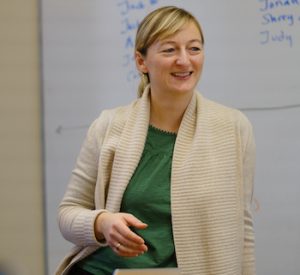 Despite the upheaval of the past two months, Katharine Millet ’00 has worked to create some regular touchpoints for her students. She begins each week with video tutorials explaining what the class will cover and shares helpful resources to guide them.
Despite the upheaval of the past two months, Katharine Millet ’00 has worked to create some regular touchpoints for her students. She begins each week with video tutorials explaining what the class will cover and shares helpful resources to guide them.
“They’ve come to expect these weekly orientation videos, and I share resources that they can access on their own time,” she said. “The routine has been helpful.”
Millet teaches two Class IV history courses, Ancient Civilizations and Modern World History. As Milton prepared to go into a remote-learning program, Millet and the other History and Social Sciences faculty members who teach the freshmen classes decided to extend the deadlines on students’ research papers when classes resumed after spring break. Their papers were due today.
For many students, the assignment is the first significant research paper they’ve ever done. Milton’s librarians have been helpful in guiding students through available resources, Millet said.
“All of my four sections are doing the same project, but every student is working on a different topic,” Millet said. “It’s challenging, but a lot of the questions they ask apply to other students—questions about citations and where to find resources, and how to determine the credibility of resources. I’m pretty impressed with what I’ve seen so far.”
Many students have shown resourcefulness, seeking out documents from places like the Boston Public Library, which has expanded its online offerings.
This is not Millet’s first exposure to online learning. At her previous school, she was part of an interdisciplinary team that received a grant to explore blended learning—a mix of in-person and digital instruction.
“That gave me a ton of resources and professional development, and also an introduction to the tools that are available,” she said.
Remote classes don’t have the same natural social atmosphere as in-person teaching, so Millet opens each synchronous class meeting by asking students to share something from their lives—what they did over a weekend, or a recent creative project, “just to get them chatting.”
“Their social life is very much their source of energy,” Millet said. “To not have access to that in the same way is certainly a challenge for them.”